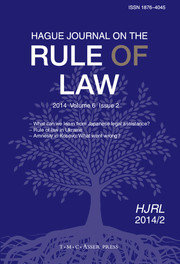Article contents
Dispensing Elusive Justice: The Kenyan Judiciary Amongst Pastoralist Societies
Published online by Cambridge University Press: 04 May 2010
Abstract
Justice sector reform and access to justice initiatives in developing countries are often pre-occupied with addressing challenges related to proximity of judicial institutions, costs of filing cases, and technical deficiencies in the system. One of the major obstacles, however, for a well-functioning rule of law can be paradigmatic contradictions between formal laws, judicial processes and local understandings of justice. In the arid north of Kenya, for example, pastoralist societies adhere to their own norms delivering justice. Indigenous means of conflict resolution have proven to genuinely reconcile and pacify society, even in serious criminal offences. Problematic is that local socio-political realities are much stronger than state institutions. Government authorities have been compelled to work with local solutionsin order to pacify the region. This sounds an alarm for the formal justice sector of the failure of its main mission – the maintenance of peace in society. If laws and judicial processes do not become increasingly responsive to socio-cultural contexts, justice sector institutions run risk of rendering themselves redundant.
- Type
- Notes
- Information
- Copyright
- Copyright © T.M.C. Asser Press and the Authors 2010
- 2
- Cited by




